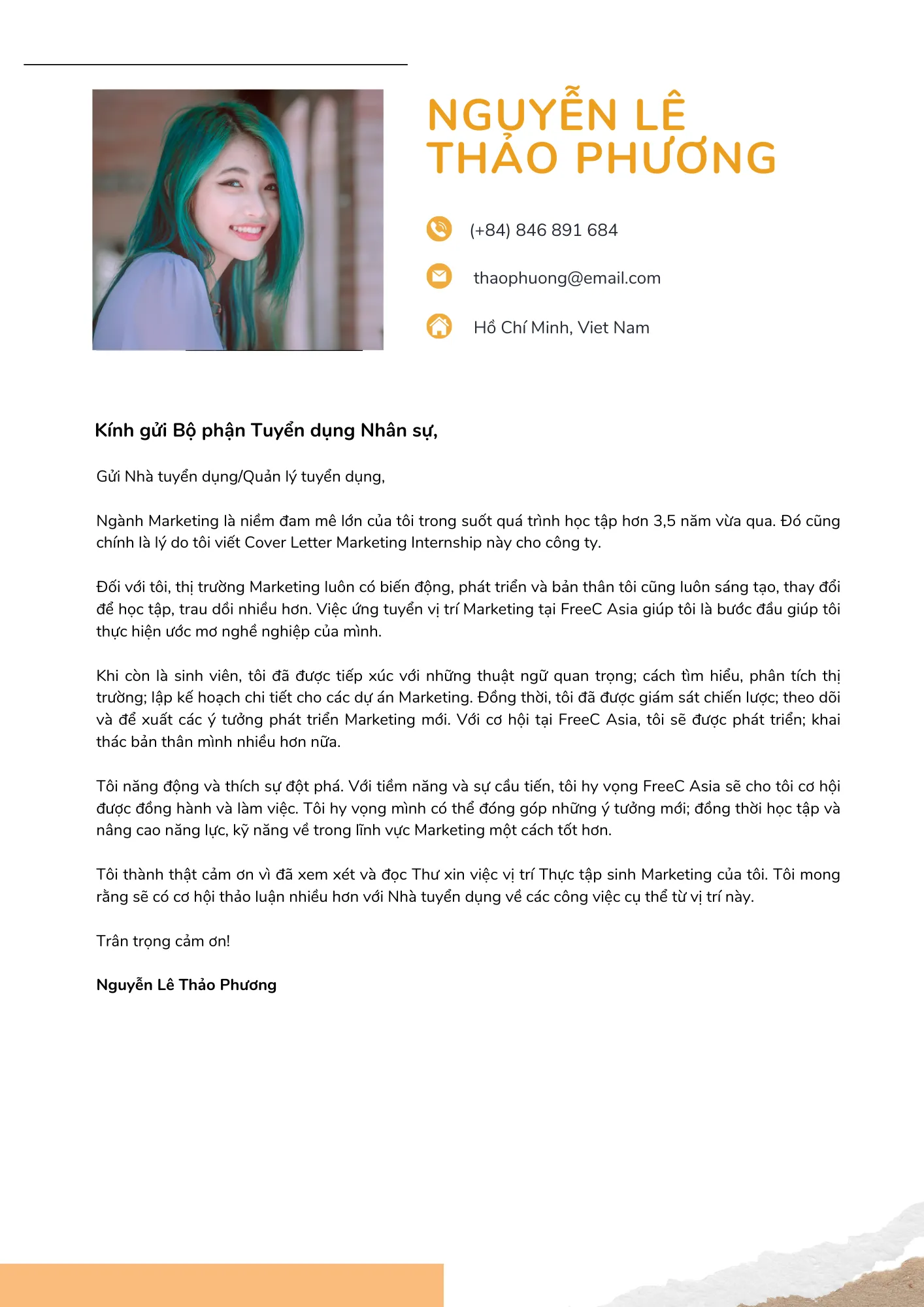Why a Cover Letter Matters for Marketing Interns
A cover letter is your first opportunity to make a strong impression on a potential employer. For marketing interns, it’s not just about listing your qualifications; it’s about showcasing your personality, enthusiasm, and understanding of the marketing field. Unlike a resume that provides a factual summary of your experiences, a cover letter allows you to tell a story, connecting your skills and experiences to the specific requirements of the internship. A well-crafted cover letter demonstrates your communication skills and your genuine interest in the company and the internship itself.
Showcasing Your Skills
Highlight the skills that make you a strong candidate. Marketing internships require a blend of hard and soft skills. Consider emphasizing your proficiency in areas like social media management, content creation, data analysis, or SEO. Also, mention your soft skills: communication, teamwork, creativity, and problem-solving. Provide specific examples of how you’ve used these skills in the past. For instance, instead of stating ‘I am good at social media,’ write ‘Managed social media campaigns, increasing follower engagement by 20%.’
Highlighting Relevant Experience
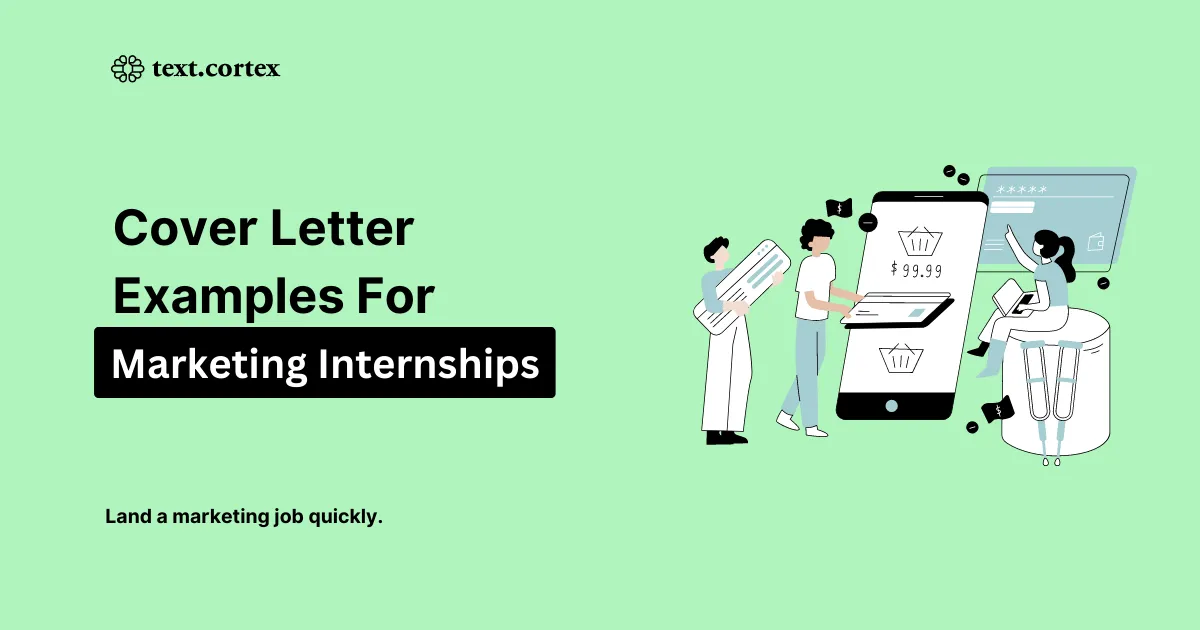
Even if you lack extensive professional experience, focus on any relevant activities, projects, or coursework. Did you manage a social media account for a club or organization? Did you create marketing materials for a school project? Did you volunteer for a marketing-related event? Be sure to quantify your achievements wherever possible; it makes a bigger impact. Don’t underestimate the value of your experiences, even if they’re outside of a traditional work setting. The key is to connect these experiences to the requirements of the internship.
Demonstrating Passion for Marketing
A genuine passion for marketing can set you apart from other candidates. Your cover letter should convey why you’re interested in the field and, more specifically, why you’re interested in this particular internship. Mention any marketing blogs you follow, industry events you’ve attended, or specific campaigns that have inspired you. Showing that you’re up-to-date with the latest trends and that you have a deep interest will demonstrate your enthusiasm and initiative. This passion is what will fuel your performance, if you are selected.
Key Components of a Winning Cover Letter
Contact Information
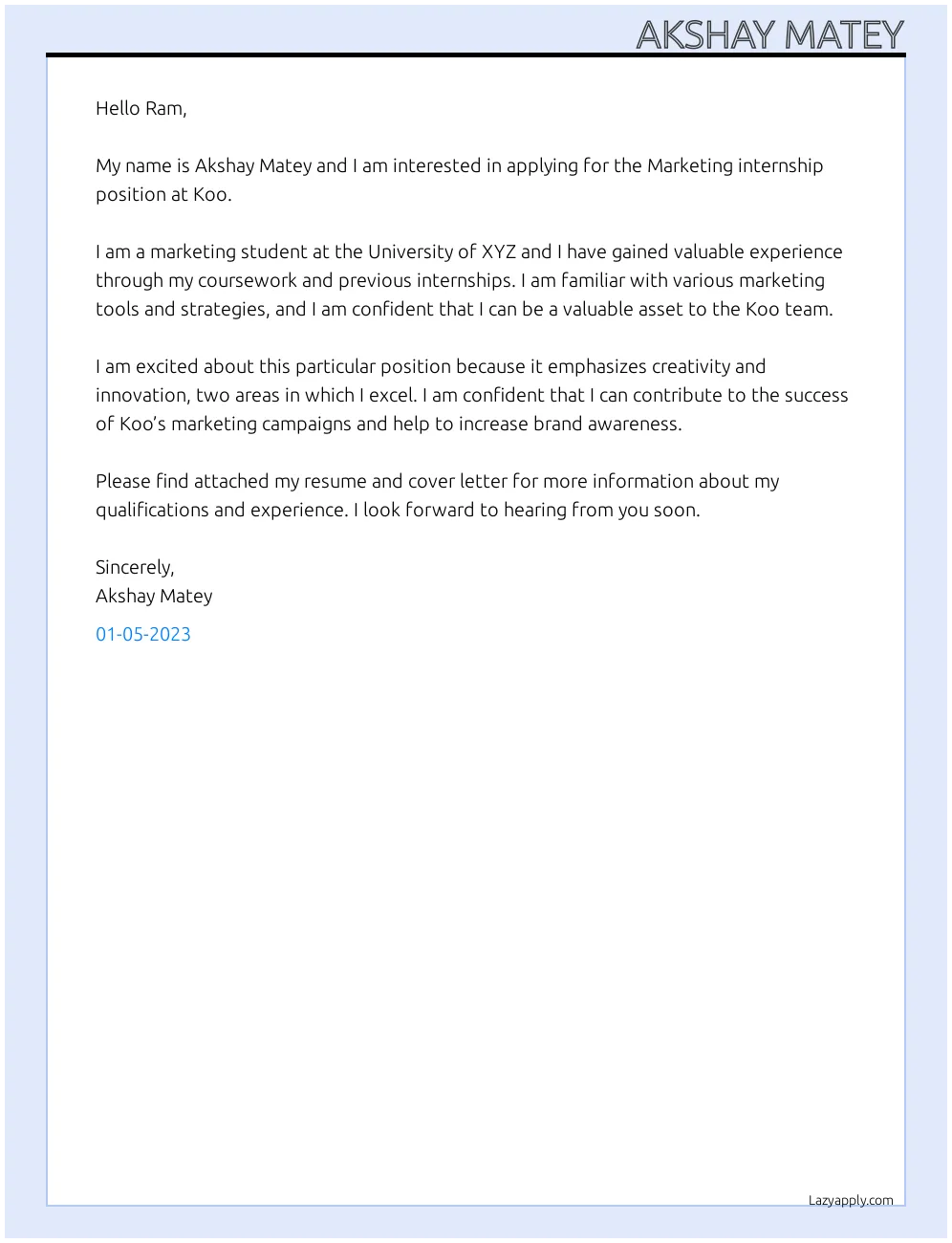
Start your cover letter with your full name, address, phone number, and email address. Make sure your email address is professional. This information ensures the recruiter has all the necessary details to contact you. The contact details should be at the top of the letter, either left-aligned or centered. This section is simple, yet very important, because it is the only way that an employer can contact you.
Professional Greeting
Address the hiring manager by name if possible. Research the company to find out the name of the person in charge of hiring. If you can’t find a specific name, use a general greeting like ‘Dear Hiring Manager.’ Avoid generic greetings like ‘To Whom It May Concern,’ which shows a lack of effort. Personalizing the greeting immediately grabs the reader’s attention and demonstrates your attention to detail.
Opening Paragraph
The opening paragraph should immediately grab the reader’s attention. State the position you’re applying for and where you found the job posting. Briefly mention why you’re interested in the internship and the company. Use a hook to create interest; this might be a specific achievement or a unique skill. The goal is to make the reader want to continue reading. Think of this as the beginning of a sales pitch - you’re selling yourself.
Body Paragraphs
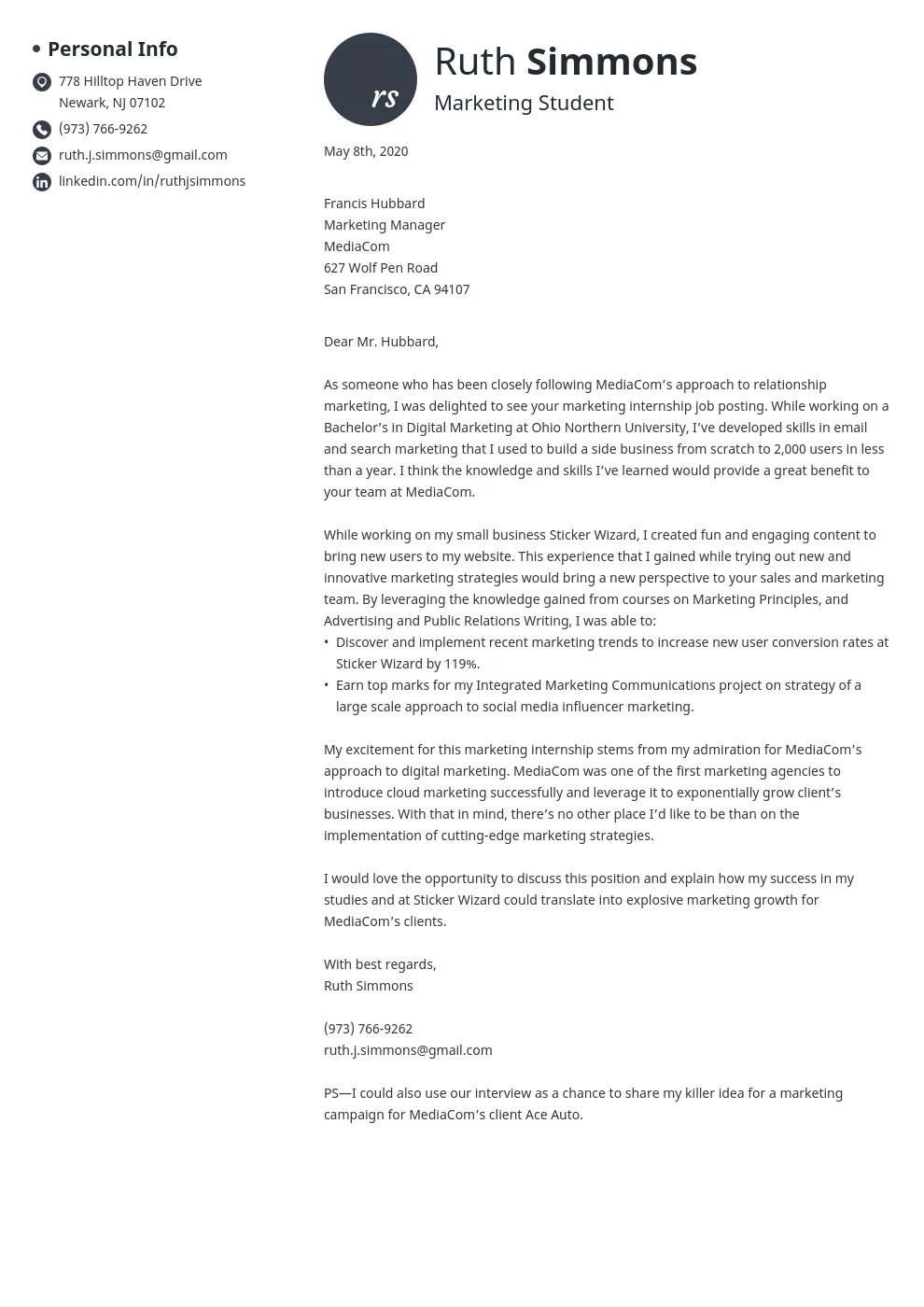
The body paragraphs are where you elaborate on your skills and experience. Use this section to highlight your accomplishments and explain how they align with the internship requirements. Provide specific examples and quantify your achievements whenever possible. Use strong action verbs to describe your experiences. Break up the information into easily digestible paragraphs. Each paragraph should have a specific focus, keeping the reader engaged and making it easy to understand your strengths.
Closing Paragraph
Summarize your interest in the internship and reiterate your enthusiasm. Thank the hiring manager for their time and consideration. Express your availability for an interview. Keep it concise and professional, restating your strong interest. Reiterate your value as a candidate and demonstrate your eagerness to contribute to the company’s success. Ensure that you show, not tell, that you’re a great fit.
Call to Action
End your cover letter with a clear call to action. State your availability for an interview and provide your contact information. Let the hiring manager know that you’re looking forward to hearing from them soon. Make it easy for the recruiter to move forward with your application. A strong call to action increases your chances of getting an interview and ultimately, the internship.
Formatting and Structure
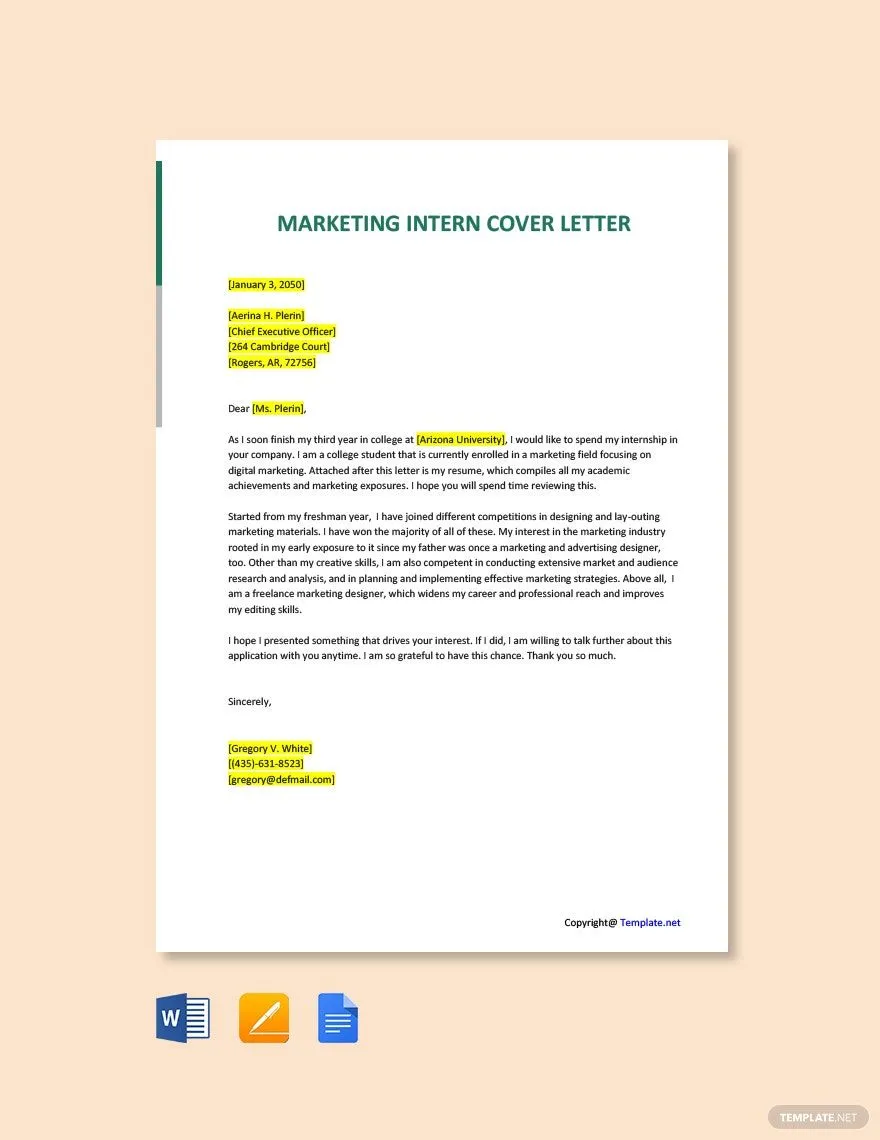
Font and Readability
Choose a professional font like Times New Roman, Arial, or Calibri, with a font size of 11 or 12 points. Ensure that your cover letter is easy to read. Use clear formatting with ample white space. Keep paragraphs short and to the point. Good formatting makes a positive impression and ensures that the reader can easily follow the flow of your ideas. Readability is just as important as the content itself.
Length and Conciseness
Keep your cover letter concise; aim for one page, maximum. Hiring managers are busy and want to quickly understand your qualifications. Focus on the most relevant information and avoid unnecessary details. Be direct and to the point, highlighting your key skills and experiences. Eliminate any fluff or filler to ensure your letter is easy to read and effective.
Proofreading and Editing
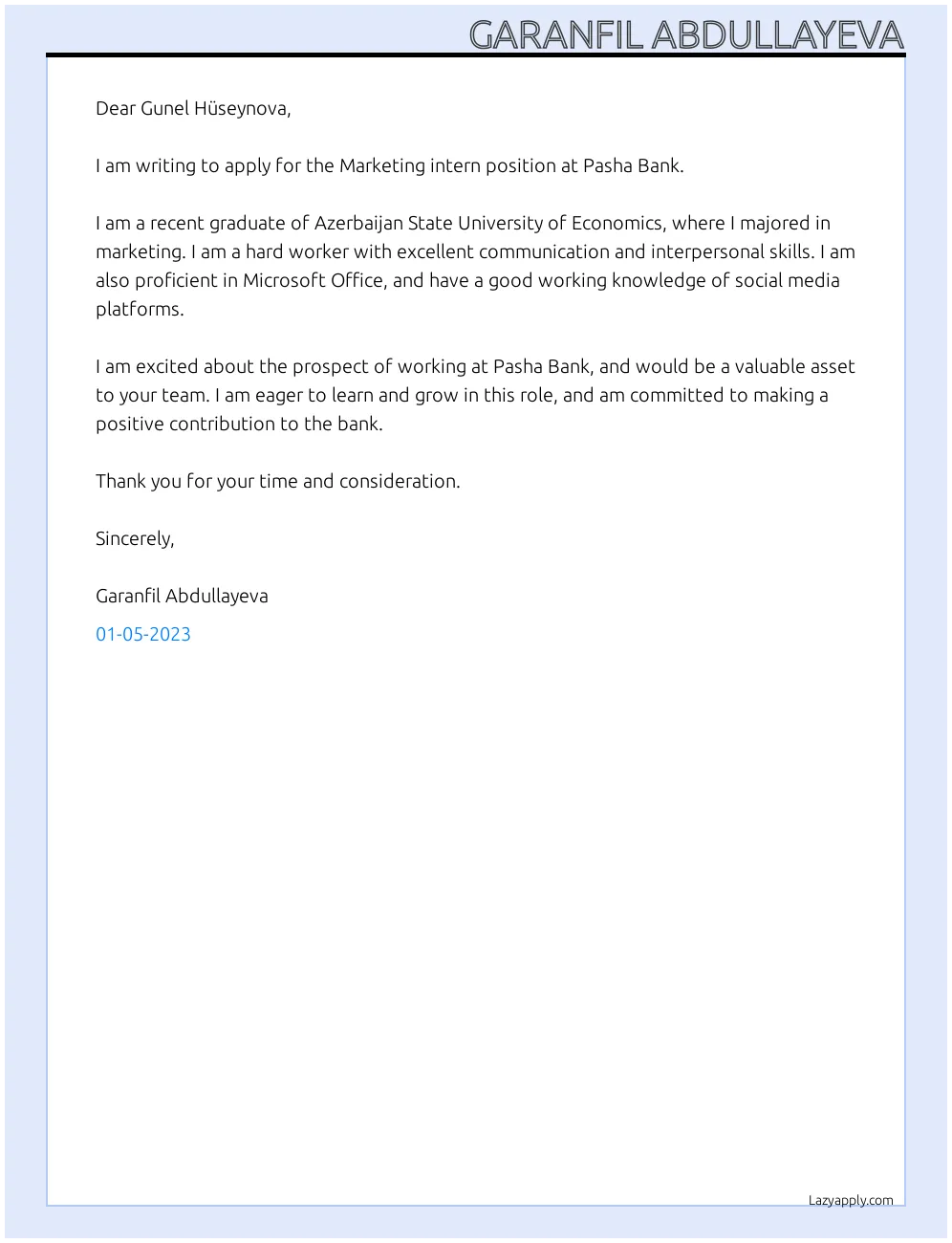
Before submitting your cover letter, proofread it carefully for any typos, grammatical errors, or formatting inconsistencies. Ask a friend, professor, or career advisor to review your letter for feedback. Attention to detail demonstrates your professionalism and commitment. Even small errors can undermine your credibility. Polished and well-edited content shows that you care about making a good impression.
Tailoring Your Cover Letter
Researching the Company
Customize your cover letter for each internship application. Research the company’s mission, values, and recent campaigns. Show that you understand their brand and the role they’re offering. Demonstrate how your skills and experiences align with the company’s goals. Researching the company shows you’re genuinely interested in the opportunity and have a solid understanding of what the company does.
Matching Skills to Requirements
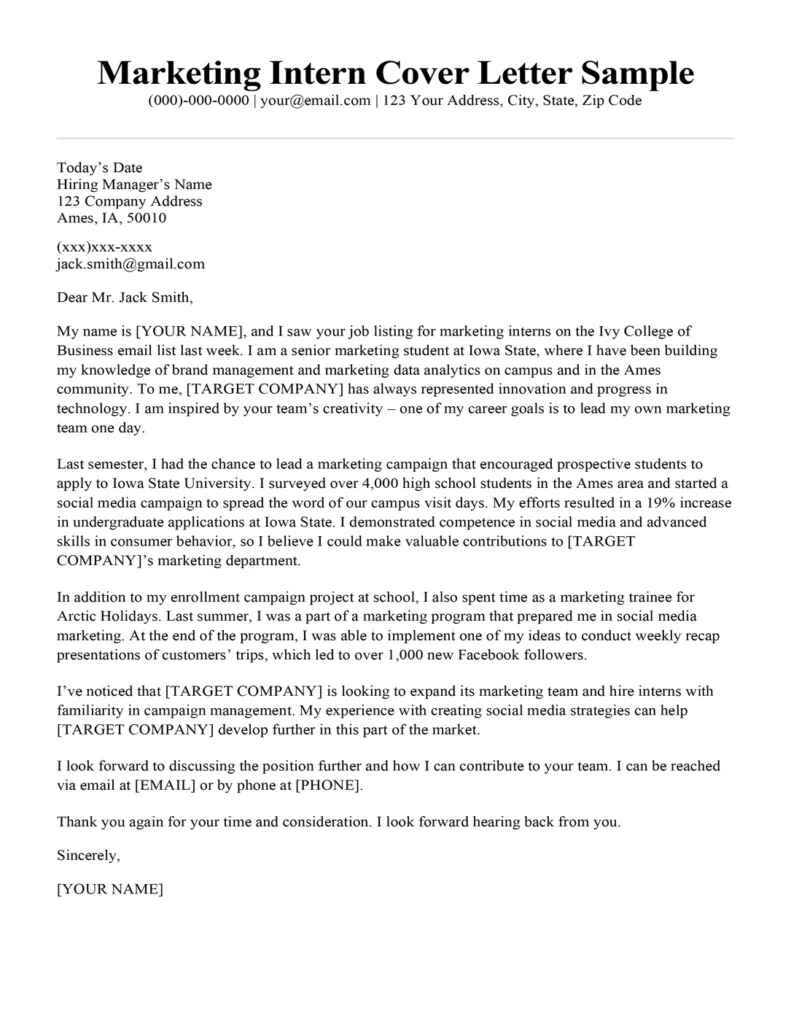
Carefully review the internship description and identify the key skills and qualifications the employer is seeking. Customize your cover letter to highlight the skills and experiences that match these requirements. Use the language from the job description and provide specific examples. This targeted approach shows the hiring manager that you’ve read the description and are a good fit. Tailoring your letter is more likely to make a positive impression.
Using Keywords
Incorporate keywords from the job description into your cover letter. Applicant tracking systems (ATS) often scan resumes and cover letters for specific keywords. Include relevant terms throughout your letter, but do it naturally and avoid keyword stuffing. This can help your application get noticed by both the automated system and the hiring manager. Keywords will also show you understand the role’s required skills and responsibilities.
Examples of Effective Marketing Intern Cover Letters
Example 1
I am a highly motivated marketing student seeking a Marketing Intern position at [Company Name]. My coursework in digital marketing and my experience managing social media for [Organization Name] have equipped me with the skills to excel in this role. I am eager to contribute to your team’s success by leveraging my data analysis skills and content creation abilities.
Example 2
As a creative and results-driven individual, I am writing to express my interest in the Marketing Intern position at [Company Name]. My passion for advertising, combined with my experience in developing and executing successful marketing campaigns, makes me a strong candidate. I am particularly excited about the opportunity to contribute to [Company’s] upcoming [Campaign Name] campaign.
Example 3
I am writing to apply for the Marketing Intern position at [Company Name], as advertised on [Platform]. My strong background in market research and my proven ability to create engaging content align perfectly with the requirements of this role. I am excited to learn from experienced professionals and contribute to [Company Name]’s marketing efforts.
Common Mistakes to Avoid
Typos and Grammatical Errors
Proofread carefully! Errors make a negative impression and suggest a lack of attention to detail. Double-check all your work. Use a grammar checker and ask someone else to review your letter before sending it. Typos and grammatical mistakes can damage your credibility and make it appear that you’re not taking the application process seriously. A flawless cover letter shows professionalism.
Generic Cover Letters
Avoid using generic cover letters that could be sent to any company. Customize your letter for each position, showing that you understand the company and the specific internship. Generic letters show a lack of effort and interest. Make the letter unique to show the company that you care about the opportunity. Customization makes a stronger case for your candidacy.
Lack of Enthusiasm
Show enthusiasm for the internship and the company. Express your interest in the position and highlight why you want to work there. A lack of enthusiasm can make the reader question your motivation. Let the hiring manager know why you’re passionate about the role. Convey your interest by detailing the company’s values and the opportunities the internship offers.
Tips for a Standout Cover Letter
Quantify Your Achievements
Whenever possible, quantify your achievements with numbers. Instead of writing ‘Increased social media engagement,’ write ‘Increased social media engagement by 30% in three months.’ Numbers provide concrete evidence of your skills and abilities. Quantifiable results make your accomplishments more impactful and memorable. Providing measurable results makes a compelling case.
Show, Don’t Tell
Instead of simply stating your skills, provide specific examples of how you’ve used those skills. Instead of saying ‘I am a good communicator,’ describe a situation where you effectively communicated to achieve a specific goal. Show the hiring manager your skills in action. Using examples strengthens your claims and makes your letter more compelling. Give context and demonstrate the result of your actions.
Follow Up
If you haven’t heard back within a reasonable timeframe (typically a week or two after the application deadline), follow up with the hiring manager. A brief email expressing your continued interest and reiterating your qualifications shows initiative and enthusiasm. Following up demonstrates your interest in the role and that you pay attention to details. This follow-up demonstrates your proactive approach.
